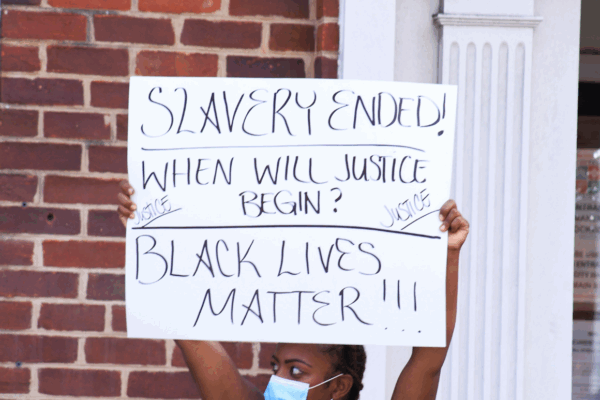America — a country established on July 4, 1776, that prides itself of being a place where “all men are created equal,” yet inequities fostered from race, wealth and social status have festered in existence to this very day. A country that went to war with a government that strangled it under a tyrannical English crown, is similar to a constant war that some Black people encounter daily as they leave their homes questioning if their lives will be taken at a moment’s notice. A country where finally affirming the importance of Juneteenth, also known as Black Independence Day, has been long overdue.
On June 19, 1865, enslaved Black people in Galveston, Texas, were finally made aware of their freedom under the Emancipation Proclamation, even though it was enacted in 1863 by Abraham Lincoln. To think, with the simple signature of a pen and ink, thousands of enslaved Black people were instantly unshackled who had remained in servitude. However, although the initial stroking of a pen was effortless, a constitutional amendment needed to be passed in order to guarantee the abolishment of slavery.
Racism is institutional. Dismantling this system of oppression will take all of us
The 13th amendment, ratified in 1865, essentially abolished slavery, but also made it legal to exploit people as a punishment for a crime: “Neither slavery nor involuntary servitude, except as a punishment for crime.” In simpler terms, the language of the amendment legally allows incarcerated populations to provide daunting prison labor for wages less than a single dollar. Although the 13th amendment is highly praised as ending slavery, the policy was a mere illusion as opposed to a definite victory.
Juneteenth is a monumental holiday for Black Americans that is worthy of profound celebration. It marks one of the first true virtues of accountability of a system that neglects and omits Black people from life-changing opportunities— which persists to this day.
It should not have taken Virginia 155 years, from the olden-days of 1865 until present-day 2020, to recognize and celebrate a day that commemorates the end of slavery in the United States.
Although Juneteenth is a time of celebration, the ACLU of Virginia, along with millions of Black Americans, acknowledge that there is a long road ahead to dismantle centuries-old systemic inequities and racism in our criminal legal system. The work towards a more just system has been a constant state of struggle, strife and trauma for Black Americans. Additionally, the current circumstances of the world have only amplified the inequities in Black communities. The debilitating spread of COVID-19 in our prisons and jails disproportionately affect incarcerated Black men and women at alarming rates. According to the Marshall Project, there have been 1,295 cases of COVID-19 reported among prisoners in Virginia; and Virginia’s incarcerated population is comprised of 55% Black people.
The never-ending trauma Black people experience from police brutality has been heightened during these times, and the Commonwealth, country and world are finally examining the distress police brutality has on the Black community. It is an anguish that Black people cannot simply just walk away from, because they will forever and always be Black. From Emmett Till in 1955 to Sandra Bland in 2015 to Breonna Taylor and George Floyd in 2020, the stories are the same, just a different excuse for justification. From accusatory whistles to ambiguous stand your ground laws, the results are and have always been the same: another young Black person left for dead.
The ACLU of Virginia recognizes the various injustices occurring within our criminal legal system. We ultimately believe that it is no longer time for a mere plastering of the words “criminal legal reform” or “police reform” on websites and news outlets. The time has come for substantial change in combatting the disheartening, racist history that Virginia has assisted towards in the upholding of systemic racism and inequality. For far too long Black people have experienced redlining, police brutality, food deserts, lack of access to quality education, lack of employment and health care, mortgage discrimination – the list could continue for days.
We have centered our priorities on expanding the right to vote and access to the ballots, protecting and reducing the number of people who are unnecessarily jailed and incarcerated and addressing racism in policing. We see anti-Black racism’s impact through overt acts of hate and violence against Black individuals. We see it in the underlying systemic policies and practices that sanction and guide our public life in Virginia. Racism is institutional. Dismantling this system of oppression will take all of us.
It has been 155 years since Juneteenth’s inception, but it’s also taken 155 years for Virginia to fully recognize Black Independence Day as a statewide holiday. It has taken 155 years for legislators to finally be encouraged to bring about change and acknowledge institutionalized racism. It has taken 155 years and longer for America to truly recognize the humanity in its Black citizens — the people who quite literally built this country. Celebrate and rejoice the holiday of Juneteenth, as it is a joyous day to praise the ambitiousness and yearning of Black Americans; however, also seize the opportunity to reflect and accept our nation’s cruel past.

